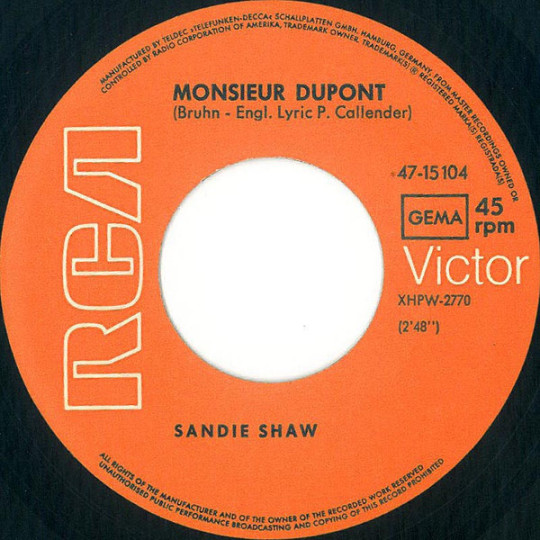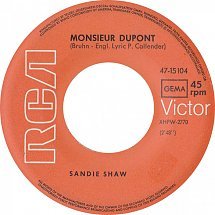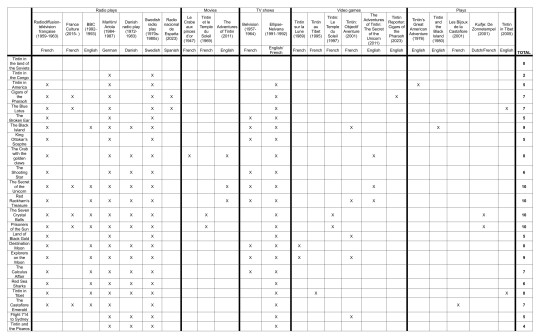#monsieur dupont
Text
youtube
Bon Matin ❤️🎙🎹 😊
Véronique Sanson 🎶 Monsieur Dupont
Live RTS
#live music#véronique sanson#music video#monsieur dupont#80s music#live music video#rts#youtube#bon matin#fidjie fidjie
15 notes
·
View notes
Quote
We do not pointedly prefer football to opera; we do not think it is better, more pure, more human to be poor than to be rich. We do not think it is inevitable that human kindness is more likely to be encountered in working class individuals than in middle class individuals. We do not think working class people are better than anybody else because they have been defined as belonging to one or other social category. We are not interested in working class culture...We do not celebrate the working class: working class life is rubbish, it is not a condition to be aspired to, and the past thirty 24 years of pro-revolutionary fetishisation of the proletariat as a thing in itself (the legend has it that the leftist group Militant used to force its activists to wear flat caps and donkey jackets on their paper sells so as to fit in) has mistaken and confused the actual power of the working class and reduced the proletariat to the status of just another oppressed minority.
Monsieur Dupont, Nihilist Communism, pg. 23-24
#monsieur dupont#nihilist communism#working class#working class culture#cult#low culture#rainbow high#fetishization
121 notes
·
View notes
Text

“The system of the motorway, the social relation of the motorway, is left untouched by any attack on its specifics - untouched or is it reinvigorated? Does it bloom like the desert in places where fire and rain have visited. Anarchism against circulation is an ethics; it doesn't hurt the motorway even though it wants to. It doesn't hurt the motorway because it is just one response among many to present conditions, and it takes its place alongside all other theories and actions as an ideology - it exists as one strand in the strand of strands of commodified consciousness.
On the motorway, everything that can happen will happen, including dissent against the motorway. But we see now that achieving the heightened condition of dissent does not bestow upon the rebel a capacity to change anything, or even to escape the conditioning of the possible exits open to her/him. Saying "no" does not transport us to a place where we might make decisions separately from the world in which we live. I have met anarchists who live like ironside puritans and others of a deliberately decadent inclination, but whether you forbid or celebrate you do not touch capitalism itself. At every point it holds you in its palm - sometimes allowing a little more movement, sometimes gripping harder. Capitalism has facilitated democracy, fascism, state socialism, theocracy, militarism, human rights, religious revivals; it processes and transforms all social organisation into its social organisation. Every political aspiration is compatible with its productive relation. You propose the counter culture? Capital will commodify it, instigate it, reproduce it, and sell it. There is no outside of the loop.
The motorway cannot be undone either by ideas or practice. It cannot be undone. You think a million people like you could do the business? Well, where are they? If you haven't got them after two hundred years of agitation what makes you think they will turn up now or at some time in the future? And do you really think it possible that a million people can believe the same thing at the same time? How would you check they were really thinking what you thought and not hoping to get something else out of it: a Phd thesis, a promotion, a ministerial promo-tion, a groovy party, radical credibility, a new girlfriend? And if they did truly believe as you believe, if they downloaded your consciousness - by what mechanism would that change the world? Proposed democratic change works like magic, it has a misdirected relation to the movement of capital: if we all think the same thing then everything will come good. In reality, we know that agreement is both false and also not decisive on the mechanisms of power, which act automatically, independently of decision-making.
Why should large numbers of people be convinced by what one person claims more than the promises of any other? The internet is full of get rich quick schemes, anarchism is just one of them.
The easy anarchist answer is that it is not thoughts that change the world but acts. The fundamental flaw in political action is this: the more militant (and therefore true) the action is, the fewer people want to participate in it. The more unreal and fluffy, the more inclined they will be to turn up. Anarchists, being mostly young men, still have not learnt that only young men like to fight back on the streets, everyone else will find excuses not to be there. In directing campaigns, the choice for activists is stark, it is between numbers or ideological purity.
But even to say that rubs some up the wrong way; all discussion subverts the glory of acts. Apparently talking and thinking gets you nowhere because "there is no point in theory without action", as if the likes of Class War or RTS have ever got anywhere. How could Monsieur Dupont demonstrate its activities on the streets? How is anarchism demonstrated on the streets? It seems after all, that all deliberate interventions made by the pro-revolutionary minority are acts but what is really important is whether the proposed interventions either achieve, or are capable of achieving, what is claimed for them.” (p. 160 - 162)
#dupont#monsieur dupont#nihilist communism#nihilism#communism#anarchism#capitalism#motorway#mao#nietzsche#accelerationism
17 notes
·
View notes
Text

youtube


sandie shaw - monsieur dupont
1969
8 notes
·
View notes
Quote
By providing us with these false opposites (globalisation/anti-globalisation, imperialism/anti-imperialism, vegan café/McDonalds, etc) the ruling classes can ensure that debates are kept on their terrain, that those with a sense of self-righteousness are kept busy playing the tiresome political games of good versus evil. These political movements, naturally, never threaten to destroy the economy (how could they?), they only offer empty threats to refine it or save it. History shows us that it is not movements that lead to genuinely revolutionary events, it is only complete economic failure and mis-management. If this occurs, and it was close to happening at the time of World War One, then it may be that the workers in those industries that are essential for the economy to keep running will be forced to take them over. It is at this point that the material basis of society will have altered, and it is now that humanity has the chance to assert itself, and prevent the re-imposition of economics
Monsieur Dupont, Nihilist Communism: A Critique of Optimism in the Far Left
50 notes
·
View notes
Text

It's Agent Ella's toughest adversary yet... or is it? Meet Monsieur Pierre Dupont, the head of the Dupont Family and crime boss of Belize.
You are Agent Ella, and you've infiltrated Dupont's home in the hopes of helping bust his drug smuggling ring! But Dupont reminds you too much of your awful ex-husband and besides, something about him doesn't seem... right.
Play Agent Ella to solve this mystery!
#agent ella#storyloom#monsieur dupont#online games#visual novel#choose your own adventure#mystery#spy#secret agent#sims#adventure
2 notes
·
View notes
Text


sandie shaw - monsieur dupont
1969
(cover manuela)
youtube
6 notes
·
View notes
Quote
I do not understand some people's difficulty with difficulty, I've never been intimidated by it, what I don't understand I skip, otherwise I an always on the look out for ideas and phrases I can refashion or steal outright, and if a text defies all efforts at comprehension, as in Becket, I just set myself the task of reading every word from beginning to end, that way at least I can claim to have got through it alive
monsieur dupont, nihilist communism
2 notes
·
View notes
Text
"Nobody can stop it because nobody chose it, it is a fact, the world we live in. In the same way a television programme critical of the psycho-sociological effects of television ultimately ends by affirming the amazing versatility of the medium, it certainly cannot turn the box off and release people to do something less boring instead. Television and the motorway, unlike the Roman Emperors, tolerate, even encourage, dissent. *
-Monsieur Dupont, Anarchist must say what only anarchists can say
28 notes
·
View notes
Text
Tintin adaptations throughout the years
The Adventures of Tintin have been adapted more than a dozen times into several different media, including radio, movie, television, theater, and video games. Most of these adaptations are based on the original 23 comics:

*Not included due to lack of information
Radio Luxembourg radio play (1956-1961) - French
Radio-Canada radio play (1962-1965?) - French
The most popular books to adapt have been The Secret of the Unicorn, Red Rackham’s Treasure, The Seven Crystal Balls, and Prisoners of the Sun (with ten adaptations each), while Tintin in the Land of the Soviets (with zero adaptations) and Tintin in Congo (with only two) have been the least popular. There have also been no adaptations of Tintin and Alph-Art. It’s interesting to note that the Swedish radio play also adapted Tintin and the Lake of Sharks, despite it not being one of the official books of the series.
The languages on the table indicate the original language the adaptation came out in; however in some were also made available in other languages as well. This is the case with the TV shows, movies (except the one from 1947), and video games.
.
There have also been other Tintin adaptations not based on original comics that were either approved or tolerated by Hergé and Moulinsart/Tintinimaginatio (links may lead to French sites when English is not available):
Movies
Tintin et le mystère de la Toison d’Or (1961) - French
Tintin et les oranges bleues (1964) - French
Tintin et le lac aux requins (1972) - French
Plays
Tintin aux Indes : Le Mystère du diamant bleu (1941) - French
Monsieur Boullock a disparu (1941) - French
Books and short stories
Dupont et Dupond, détectives (1943) - French
Tintin et Milou chez les Toreadors (1947) - French
Tintin in the New World: A Romance (1993) - English
All three movies have had books made, though only Tintin and the Lake of Sharks was adapted into an official comic. The 2011 movie was also adapted as a novel.
The plays and the short story Tintin et Milou chez les Toreadors have seemingly been lost to time, so all that remains are summaries online and the occasional photo.
Interestingly, the first adaptations date back to 1941, but it isn’t until 1947 that the first adaptation of one of the comics is made. Since Hergé’s death, only one adaptation not based on the original comics has been published, and only because it received his approval before his death.
#yes im a big nerd that likes to look at this stuff lol#i may have missed one or two esp if they were not in english or french#but i think this paints a pretty clear picture of the tintin adaptations that exist#crying at all the lost media we'll never get to hear or read :(((#a lot of these adaptations can be found online tho so that's good! :)#tintin#the adventures of tintin#tintin adaptations
46 notes
·
View notes
Text

Nancy’s AI Adventure, Part 6
Nancy put a protective arm around DuPont’s tensed shoulders. “Don’t worry, monsieur,” she hissed in the restauranteur’s ear, “no one will harm you while you are my prisoner!” Marcel grunted but whether from gratitude or resentment she couldn’t tell. The man had said two of his people were also working with the cartel. “Your, er, associates, monsieur,” Nancy continued, “is one of them a woman?” Marcel snorted. “A woman?” he repeated derisively. “Of course not!” But then stopped, realising how incongruous his sexism was when he had just been captured by a woman. Nancy was used to misogyny in her line and took no heed. Instead, she braced, ready for action once more as the female form came into focus.

Then her face widened into a broad smile. “George!” she exclaimed as she recognised her friend. “Oh it’s good to see you!” She ran forward to embrace the dark-haired girl, laughing with delight and relief. “We had tried everywhere else, so we figured you had to be here in the restaurant cellar!” George replied, hugging Nancy. “This is a very fishy operation,” she went on, “and I don’t mean the menu!” Nancy nodded. “I know, George.” she smiled. “Monsieur Dupont here has made a full confession!” George looked over at Nancy’s bound captive. “Honestly, Nance, you are amazing!” she laughed.

“We need to get him to the sheriff so he can tell him everything he told me.” Nancy told her friend earnestly. “Dupont has enough on the drugs ring to sink it entirely in River Heights!” George nodded. “I don’t think he is a one man band though, Nance.” she replied. “Bess is in the restaurant now, trying to see if she can winkle out a confession too.” Nancy walked over to the surly looking Dupont. “Maybe if they see their boss is caught, it will encourage his accomplices to surrender too.” she suggested. Dupont just glared at her. George joined Nancy and together they walked the glowering Dupont down the cellar corridor and towards the stairs leading to the restaurant. “Ready to meet your public, monsieur?” Nancy asked her prisoner ironically.
To be continued.
AI images created via Microsoft Bing
#nancy drew#woman detective#mystery#capture#adventure#girl detective tying up bad guy#girl detective#river heights
9 notes
·
View notes
Text
Joseph and Napoleon, again.
Still reading the correspondence between Napoleon and Joseph during the Peninsular War, and I can’t decide whom of the two correspondents I dislike more. Napoleon still boasting »I will in Spain find the Pillars of Hercules, but not the limit of my power«, while Joseph - who has warned him over and over that things are going really, really badly here - after the capitulation of Baylén is already on the road from Madrid back to the French frontier, running from an army of infuriated Spanish insurgents … that’s really hard to stomach and makes me pity Joseph, who sees much better how things really stand, but whose opinion, it seems, Napoleon never takes serious.
And yet I think I’m also starting to understand why, despite Joseph’s and Murat’s problems being so similar in nature, I have far more sympathy for Murat than for Monsieur Joseph.
This is from a letter Joseph wrote to Napoleon in 1808, when he had been driven from Madrid the first time, after Dupont’s capitulation at Baylén and literally only a couple days after he had first entered Madrid:
Joseph to Napoleon, Burgos, 9 August 1808
[…] I found here other people of my household who left Naples after it. I have been here since this morning; I have been thinking a great deal about the situation of Spanish affairs, about those of Naples, and about Your Majesty's letter of 3 August, in which she tells me of my fondness for the Spaniards. I disregard all intermediate ideas, and here is the result of my reflections:
1° Since much blood and money is needed to conquer Spain, France is entitled to find an indemnity for it, and to ensure that these peoples, who will long hold a feeling of animosity against her, cannot essentially harm her. For this, Spain must be reduced to the point of being powerless to give in to this resentment: joining the provinces beyond the Ebro to France, joining Galicia to Portugal, dividing up the Spanish possessions, would make what would remain of Spain descend to the rank of a third power; [...]
It would be possible, by returning the increased Portugal to the house of Braganza, and disposing of Spain and the Spanish possessions, to make them objects of compensation, the price of the war and the token of a general peace [...].
2° When I consider myself in this matter, it is impossible for me not to become at once a stranger to Spain. Honour, conscience, or finally that hidden instinct which is the motive of all my actions, […]
… Money? Or women? It has to be one of those two!
[…] would never allow me to remain on the throne of Spain, if that monarchy were to be reduced in the least part.
Of course. Ruling over a third degree power would be beneath one Joseph Bonaparte.
In the supposition that France would want to gratuitously lavish her blood and gold to place and maintain me on the throne of Spain, I cannot conceal from Your Majesty that I could not bear the idea that another than Your Majesty should command the French armies in Spain. Having become the conqueror of this country through the horrors of the war in which all Spanish individuals will take part, I will long be an object of terror and execration. I am too old to have the time to repair so many evils; and I would have sown too much hatred during the war for me to be able to reap in my last years the fruit of the good that I would have been able to do during peace, in the midst of preventions and calamities of all kinds.
To sum up: Joseph is not necessarily against using violence against the Spaniards – to the contrary, he is fully aware that a ruthless oppression will be necessary in order to get a hold of the country, and he even suggests that the country be split up, rendered powerless forever, and certain regions be used as barter goods with the Brits for a general peace.
He just does not want to be the one to do it.
In exchange for the priviledge to see his brother sit the throne of Spain, Napoleon please do all that ugly fighting and butchering and maiming. M’kay? Getting his hands dirty, that’s nothing for a person as delicate as Joseph. He wants to be seen as the good guy by his new subordinates, so he cannot be involved in any of the ugly stuff. But, hey, Naps, that’s precisely what you went to Brienne for, right? So just invest some fifty millions in money and some fifty thousand soldiers (Joseph keeps asking for this over and over, before he even has reached his capital), kill whoever you need to kill in order to make sure that the Spanish will not rebel again, and I’m all yours to wear that crown.
And in case Napoleon should adopt neither of Joseph’s suggestions (either split up Spain and make it powerless, or beat it into submission and then place Joseph on the throne), Joseph will do what any person in his right mind would do, call it a day and go back to his much more comfortable throne of Naples. Sorry, Naps, surely you will understand.
I can’t help but feel a lot of Schadenfreude at the thought that, when Joseph was writing this, Naples had already been given to Murat.
20 notes
·
View notes
Quote
What is needed in the revolutionary struggle is precedence given to the needs of the body (consumer culture is a contemporary echo of this). The slogans are not inspiring or romantic: more rest, more pay, less work, no deals on productivity. However, once this demand-regime is set in motion it cannot be side-tracked except by counterfeit political demands, or formulations of radical consciousness made by those who seek to lead it. Once the body tends toward rest, it cannot rid itself of that inclination unless it is roused again to work for some political vision. In short the struggle of industrial workers against capital will be conducted entirely in selfish terms, which in the end describes itself as the struggle against work in the interest of highly paid sleep. In the present nothing has significance but the desire to extend half-hour lunch breaks into hour lunch breaks. If all pro-revolutionaries grasp this they will stop worrying about the precondition of consciousness. It is within the political-economic figure of the imposition of work and its negation (which is comfort), that pro-revolutionaries could make a contribution to their workplace struggles. The struggle is against the maximisation of productivity and for the maximisation of rest. If workers could win their struggle in these terms then they will have broken up the basic mechanism of the capitalist system.
Monsieur Dupont, Nihilist Communism, pg. 26-27
#monsieur dupont#nihilist communism#revolution#struggle#revolutionary struggle#rest#body#embodiment#bodily needs#sleep#work#selfishness#egoism#comfort#anti-work
70 notes
·
View notes
Text
“Morning always seems too stale to justify
Lament blossoms, hours, minutes of our lives
Broken thoughts run through your empty mind
At least a beaten dog knows how to lie”
Sleepflower - Manic Street Preachers
youtube
“The world will not be changed by millions of people voting for change, or demonstrating for change, because capitalist power is not constituted with reference to human feelings: political desires and demonstrations, which are the social forms consciousness takes, cannot touch capitalist domination but are merely determined by it. We have no place for consciousness in our scheme, we see no need for a generalised formulated desire for revolution. Revolution belongs to the mute body and its resistance to, and its giving out to, the imposition of work. What is needed in the revolutionary struggle is precedence given to the needs of the body (consumer culture is a contemporary echo of this. The slogans are not inspiring or romantic: more rest, more pay, less work, no deals on productivity. However, once this demand-regime is set in motion it cannot be side-tracked except by counterfeit political demands, or formulations of radical consciousness made by those who seek to lead it. Once the body tends toward rest, it cannot rid itself of that inclination unless it is roused again to work for some political vision. In short the struggle of industrial workers against capital will be conducted entirely in selfish terms, which in the end describes itself as the struggle against work in the interest of highly paid sleep. In the present nothing has significance but the desire to extend half-hour lunch breaks into hour lunch breaks. If all pro-revolutionaries grasp this they will stop worrying about the precondition of consciousness. It is within the political-economic figure of the imposition of work and its negation (which is comfort), that pro-revolutionaries could make a contribution to their workplace struggles. The struggle is against the maximisation of productivity and for the maximisation of rest. If workers could win their struggle in these terms then they will have broken up the basic mechanism of the capitalist system.
The struggle of the body for rest is not the revolution, it is merely the crisis of capital. A crisis because it brings the massed, accumulated, fossilised acts of the past and the sedimenting/accumulating dead acts of the present, along with the possible conditions for the future, together in collision and in this standstill all value ceases to be enforced, leaving the world in a kind of zero hour/zero place where everything is contestable. (When the traffic stopped last September during the Fuel Protests, a man on a bicycle passed me and said, "I can hear the birds singing." We have heard what economic collapse sounds like.) When industry stops everything in society, otherwise absolutely determined by it, floats free from its gravity. In this particular crisis of capital all hell breaks loose; then comes the time for organisation. You can call that consciousness if you want, we don't care.” - Monsieur Dupont, ‘Nihilist Communism: A Critique of Optimism in the Far Left’ (2009) [p. 26 - 27]
#dupont#monsieur dupont#nihilist#communism#manic street preachers#sleepflower#gold against the soul#sleep#worker#revolution#consciousness
3 notes
·
View notes
Quote
Information has removed the meaning from all messages and this is why we must consider concepts of crisis, collapse, and economic struggle within the sphere of production. Concepts, in other words, that do not rely upon political forms and their distribution.
Monsieur Dupont, Nihilist Communism: A Critique of Optimism in the Far Left
42 notes
·
View notes
Note
top 5 books of all time?
Marx's Capital vol. 1, Clausewitz' On War, Monsieur Dupont's Nihilist Communism, Sun Tzu's Art of War, Stirner's the Unique and its Property
17 notes
·
View notes